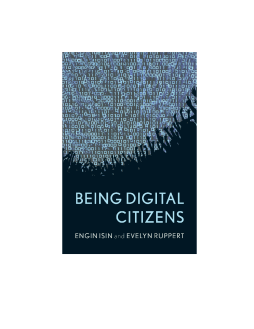
Additional Information
Book Details
Abstract
From the rise of cyberbullying and hactivism to the issues surrounding digital privacy rights and freedom of speech, the Internet is changing the ways in which we govern and are governed as citizens.
This book examines how citizens encounter and perform new sorts of rights, duties, opportunities and challenges through the Internet. By disrupting prevailing understandings of citizenship and cyberspace, the authors highlight the dynamic relationship between these two concepts. Rather than assuming that these are static or established “facts” of politics and society, the book shows how the challenges and opportunities presented by the Internet inevitably impact upon the action and understanding of political agency. In doing so, it investigates how we conduct ourselves in cyberspace through digital acts. This book provides a new theoretical understanding of what it means to be a citizen today for students and scholars across the social sciences.
Being Digital Citizens takes a nuanced, theoretical look at how the definition of a political subject evolves as more and more of both day-to-day life and overt political action takes place through digital space. Isin and Ruppert draw from rich literatures in political science, sociology, and critical theory to refocus academic debate about digital political life around the figure of the ‘digital citizen’. . . .In a literature that tends towards extremes, declaring that the Internet changes either everything or nothing, Isin and Ruppert do an excellent job of explaining exactly how the digital context is and is not important for the politics of citizenship. They argue that doing life and politics through the Internet means political thought must revisit the influence that the anonymity, extensity, traceability, and velocity of our actions have. . . .Terms are explained with admirable theoretical precision, which makes the theory Isin and Ruppert develop relevant for all readers of this journal, not just those who concentrate on digital media, while still retaining enough specificity to comment directly on digital media and digital acts. Being Digital Citizens contributes a nuanced, flexible, and still elegantly workable conceptual framework to scholarship around contemporary political activity, particularly that unfolding through the internet.
What does it mean to be a digital citizen in a world where social traffic increasingly happens through online platforms? In this timely and intelligent book, Isin and Ruppert pose a number of fundamental questions about the rights and (speech) acts of citizens living in a new global online space. This book is a must-read for all students and scholars in digital media studies, especially those interested in human beings as the new 'data subjects’.
José van Dijck, Professor of Comparative Mediastudies, University of Amsterdam
This book is a tour-de-force that — at last — explores systematically the emerging figure of the digital citizen. The rights-claims that distinguish this figure cannot be grasped through conventional analyses of either the digital or the citizen. This careful analysis shows not only how they may be rethought but how they will make a difference.
David Lyon, Queen’s University, Canada
Being Digital Citizens presents an incisive and galvanizing account of the political actions and experiences of digital citizens. Refreshing stale oppositional debates over rights, freedom and liberation through the internet, it offers a lucid and concrete account of transformations in what citizenship means.Hardly any other account of digital political life has managed to effectively sustain a dual focus on both the digital and political in the way this book does.
Adrian MacKenzie, Department of Sociology, Lancaster University.
Conceiving of citizens as political subjects who interact with and through the Internet, Isin and Ruppert offer a sound theoretical discourse that draws on a wide range of relevant research and subsequently expands on the notion of citizen—a figure in cyberspace actively involved in making rights claims via the Internet. In contrast to citizenship studies in which the cyberspace figure's relationship to politics is practically lost, this digital study draws attention to the political role of subjectivity in cyberspace. Based on this broad conceptualization of digital citizens and drawing on Michel Foucault’s thoughts on the transformation of power, the discussion begins with a focus on relative space in terms of how digital citizens act through the Internet and realize cyberspace. The Internet allows 'doing things with words and saying words with things.' This fundamental understanding of citizenship relative to the Internet’s ability to facilitate digital interactions and transactions paves the way for conceptualizing digital acts as a kind of speech act and understanding the realization of digital rights claims. Summing Up: Recommended. Graduate and research collections.
Engin Isin is professor of politics at The Open University, UK. He is a leading scholar in citizenship studies and has published thirteen books in the field, including Being Political and Citizens Without Frontiers. He is a chief editor of the journal Citizenship Studies.
Evelyn Ruppert is professor in the Department of Sociology at Goldsmiths, University of London, UK. She is a Data Sociologist and founding and chief editor of the journal Big Data & Society.
“Being Digital Citizens goes a long way toward untangling the language of digital citizenship and its highly normative force … [Ingin and Ruppert’s] insistence on conceiving the ‘digital citizen as yet to come’ opens up new trajectories for scrutiny and inquiry as well as intervention … this volume is a provocation, a point of reflection and a spark for further conceptual and empirical work.”
